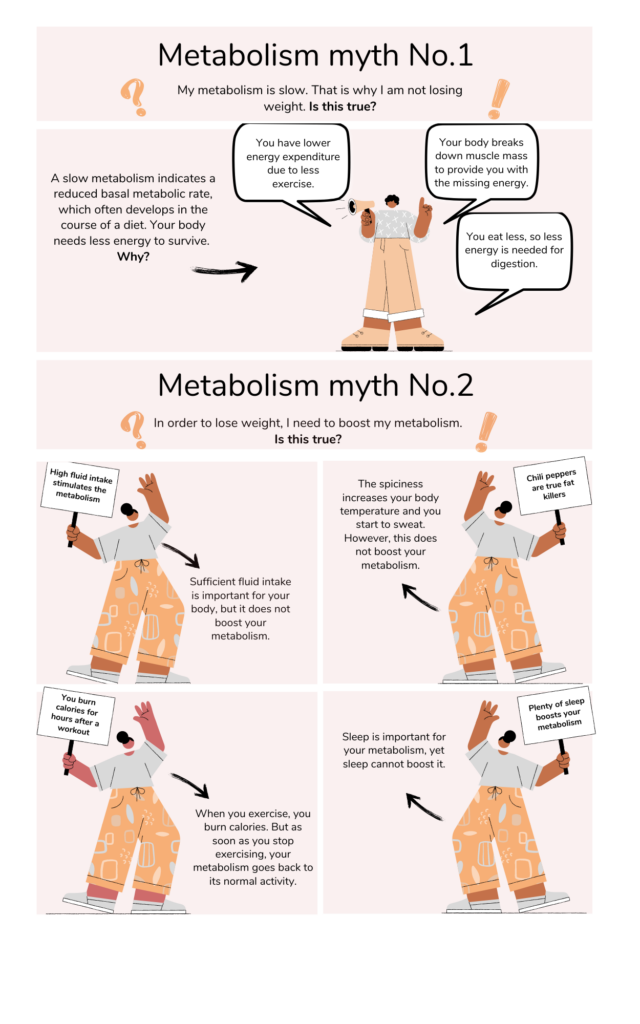
Major points:
- Overweight and obese people are said to have a slow metabolism.
- To lose weight, it is supposedly necessary to boost the metabolism, e.g. with chili peppers or green tea.
- Neatic considers these metabolism myths to be scientifically untenable.
Your metabolism includes all vital processes in your body. Overweight people are often said to have a slow metabolism which prevents one diet after another from having any effect on body weight at all. Therefore, several myths exist how to boost your body’s metabolism.
The most common metabolism myths
Metabolism Myth No. 1 - My metabolism is slow. That is why I am not losing weight.
When it comes to losing weight, it is all about energy metabolism. This part of your metabolism supplies your body 24/7 with energy. Without this energy, your body cannot maintain vital functions such as breathing, digestion, and the regulation of your body temperature.
Where does the myth come from that a slow metabolism is the cause of every failed diet?
A standard diet always means a large calorie deficit. You consume significantly fewer calories and, thus, less energy than you need. This puts your body on alert. As a result, your body’s energy stores are depleted to provide enough energy and nutrients. Since these energy stores are limited, your body’s energy need must also be reduced. This is often referred to as a reduced basal metabolic rate which can be caused by the following mechanisms:
1. Less exercise
Your motivation to exercise decreases after some time. This is a strategy of your body to save energy. Less exercise means less energy consumed. Often you do not even notice that you are moving a little less or that you are not doing your workouts with quite as much drive as before.
2. Reduced muscle mass
Muscles are one of the largest energy consumers and largest energy stores in your body. By reducing muscle mass during a diet, two problems are “solved”: On the one hand, less muscle mass requires less energy. On the other hand, muscle breakdown provides the energy that is urgently needed during a diet. Of course, muscle mass is broken down step by step and not all at once. Your body will focus mainly on skeletal muscles, which is the type you build during strength training.
3. Less energy needed for digestion
To maintain a calorie deficit, you automatically eat less. As the body also needs a certain amount of energy to digest food, it also uses less energy here.
A slow metabolism means a reduced basal metabolic rate and your body needs less energy to survive. This is a built-in protective mechanism. How the body reduces the metablic rate was demonstrated impressively in a study by Fothergill et al. (2016). In this study, 14 participants of the weight-loss show “The Biggest Loser” were subsequently studied for six years. Participants lost an average of 58 kg during the 30-week show. In the six years after the show, 13 of the 14 participants regained on average 41 kg of weight. Participants showed a reduction in basal metabolic rate of approximately 600 kcal per day by the end of the 30-week show. This reduced basal metabolic rate remained as a “diet scar” six years after the end of the show, despite the strong weight regain.
Metabolism Myth No. 2 - In order to lose weight, I need to boost my metabolism.
In the diet world, there is a firm belief that a boosted metabolism uses more calories and, thus, ensures weight loss. To boost your metabolism, there are various recommendations, drinks, powders, and pills. Below you will find some of the most frequent claims:
1. High fluid intake stimulates the metabolism
Sufficient fluid intake is important for your body, but it cannot boost your metabolism. However, smart beverage choices can help you lose weight, as long as your drink is free of sugar and sweeteners. This includes water, as well as unsweetened tea and coffee. Compared to sugary drinks, you can save a lot of calories. Stay away from light and zero drinks, as sweeteners also lead to weight gain.
2. Chili peppers are true fat killers
Chili peppers contain the substance capsaicin, which is responsible for their spiciness. Spiciness increases your body temperature which your body compensates by sweating. This process allegedly consumes so much energy that the fat metabolism is stimulated.
In a meta-analysis by Whiting et al. (2016), it was indeed proven that an intake of capsaicin led to a lower energy intake at each meal compared to the intake of a placebo. However, the validity of this study is limited because the amount of capsaicin and also the duration of the included studies are very different and the subjects were of normal weight on average.
3. You burn calories for hours after a workout
During exercise, you burn calories and your metabolism is running at full speed. But as soon as you stop exercising, your metabolism goes back to its normal activity. Therefore, you cannot work off a bad diet.
Exercise is important though. You should make sure that you get at least some exercise so that you feel healthy and fit. Everyday activities like walking, taking your bike, taking the stairs, and doing the chores are often sufficient.
4. Plenty of sleep boosts your metabolism
The bad news is that getting enough sleep will not boost your metabolism.
However, a study by Patel and Hu (2012) showed that too little sleep can lead to weight gain. You are hungrier without sleep and tend to eat more which leads to higher calorie intake. This connection seems to be particularly strong in children and decreases with age. However, too much sleep might also contribute to weight gain, especially in adults.
The optimal sleep duration varies between individuals and you have to find out for yourself how many hours of sleep you need.
Are there disorders affecting the metabolism?
Yes! Various metabolic disorders can affect body weight and have other serious consequences. They can be genetic or be acquired during the course of life. The most common metabolic disorders include diabetes mellitus, gout, and thyroid disorders.
What does Neatic recommend concerning metabolism myths?
Enjoying exercise and a restful sleep can support a balanced metabolism and a healthy body weight. All the recommendations, drinks, powders, and pills that are supposed to boost your metabolism and accelerate weight loss, however, are not worth the hype and are often expensive.
If you want to improve your well-being and are tired of standard diets, check out Neatic. Neatic is easy to implement and can help to change your diet in the long run. Weight loss is not the major focus, but you can lose a few kilos. Find more about Neatic here.
Bibliography:
Fothergill, Erin; Guo, Juen; Howard, Lilian et al. (2016): Persistent metabolic adaptation 6 years after “The Biggest Loser” competition. In: Obesity (Silver Spring) 24 (8), S. 1612–1619. DOI: https://pubmed.ncbi.nlm.nih.gov/27136388/.
Harmjanz, Freya (2021): Biochemie – Energiestoffwechsel. 1. Aufl. Berlin, Heidelberg: Springer Berlin Heidelberg.
Heinrich, Peter C.; Müller, Matthias; Graeve, Lutz; Koch, Hans-Georg (Hg.) (2022): Löffler/Petrides Biochemie und Pathobiochemie. 10. Aufl. Berlin, Heidelberg: Springer Berlin Heidelberg.
Patel, Sanjay R.; Hu, Frank B. (2008): Short sleep duration and weight gain: a systematic review. In: Obesity (Silver Spring) 16 (3), S. 643–653. DOI: https://pubmed.ncbi.nlm.nih.gov/18239586/10.1038/oby.2007.118.
Whiting, S.; Derbyshire, E. J.; Tiwari, B. (2014): Could capsaicinoids help to support weight management? A systematic review and meta-analysis of energy intake data. In: Appetite 73, S. 183–188. DOI: https://pubmed.ncbi.nlm.nih.gov/24246368/.
